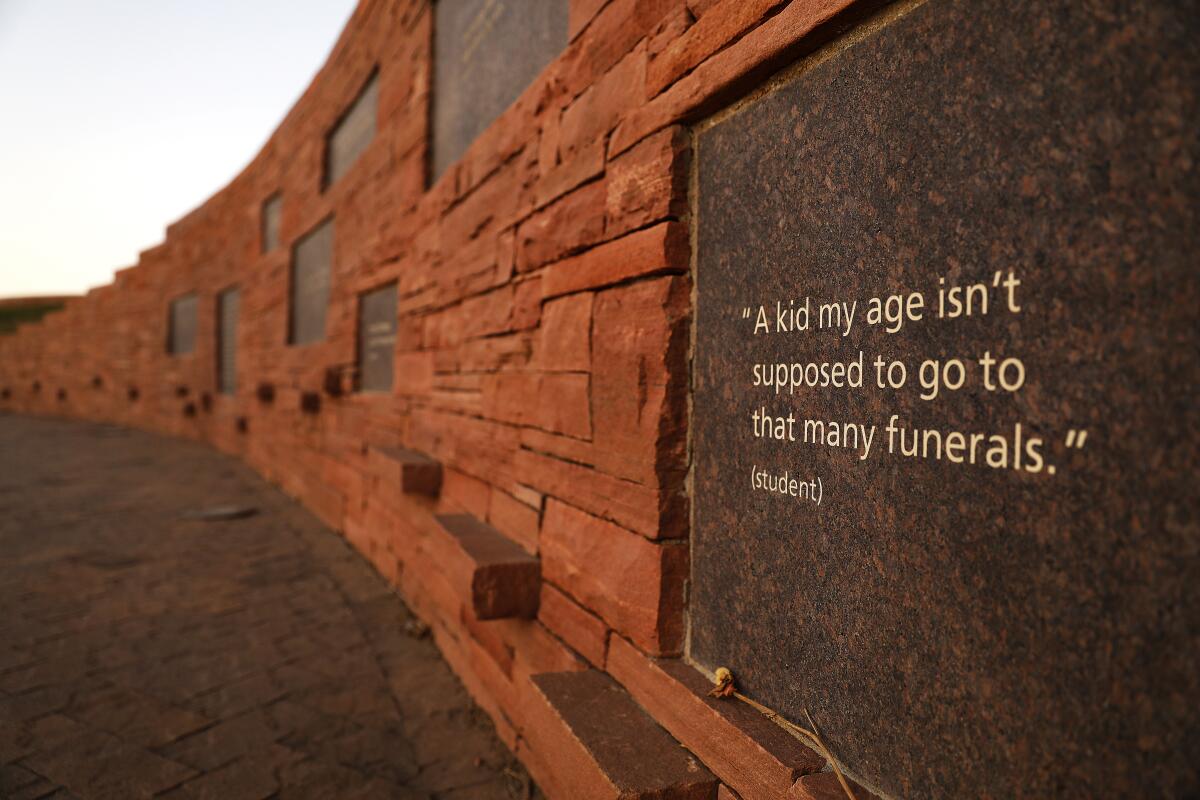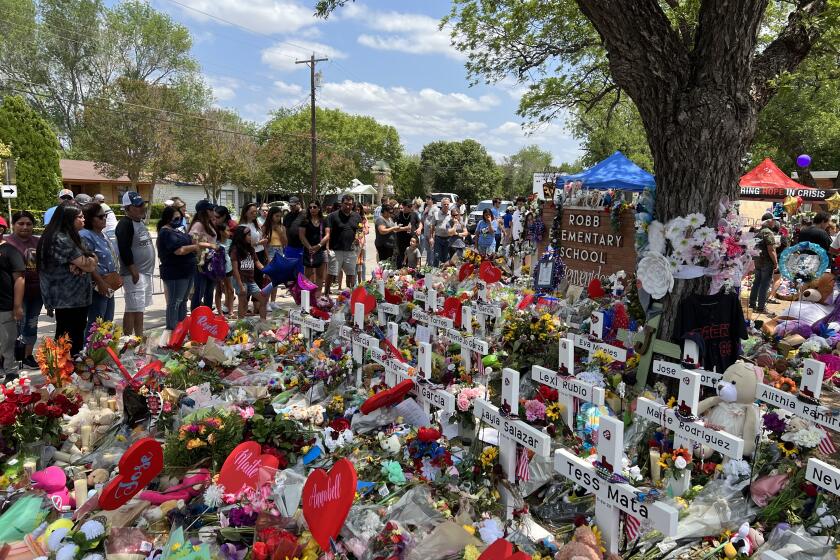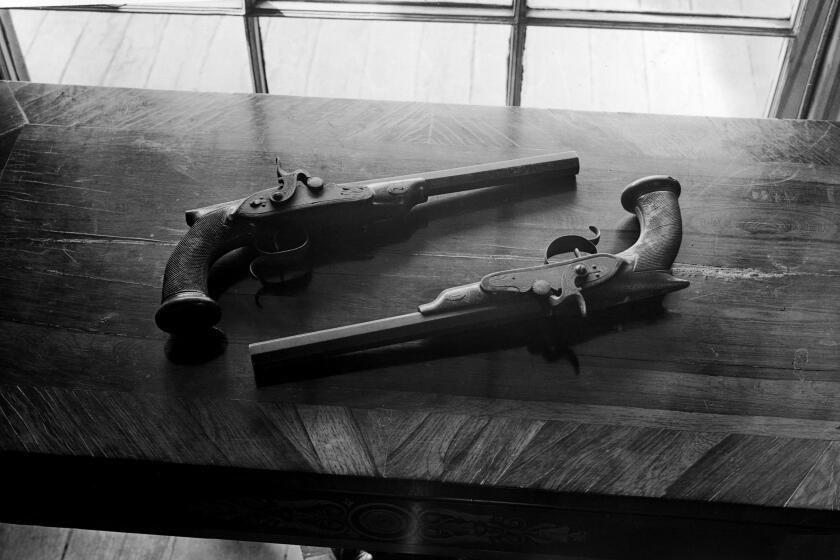I lived through Columbine. Here’s what I have to say to survivors of mass shootings

- Share via
Dear Survivor,
Our country has mass shootings almost daily now. Each time, I think of you. Even after all these years, I know what you are going through. I know how you can’t breathe right now. How you both crave and dread the news. I wish I could tell you that it will all be OK soon. That you will get on with your life. But that would be a lie. You will always have your event as a sharply remembered life moment, you will always be different because of what you’ve endured.
In 1999, at age 17, I crouched on the floor of Columbine High School’s cafeteria while two of my friends began their murderous spree, ultimately killing 13 classmates and one teacher. I got out, but from that moment, my life was divided into Before and After. For a long time, I sought the Before; I held on to the remembered experience of who I was and how I thought my life was meant to be lived. I had believed that I was going to be a photographer or a journalist, but somehow neither of those goals solidified in the After. I worked hard to ignore the pain and grief that I felt in the aftermath. I hid my past and even lied about where I was from in order to not be connected to Columbine. But trauma doesn’t work that way. No matter how much I ignored it, the anxiety would emerge and threaten to swallow my life. It was like a part of me was still frozen and afraid on that cafeteria floor. Two decades later, I have learned that we can’t ever return to the Before. Instead, we change. Our very bodies are altered by our trauma. Trauma takes root in our biology. Trauma affects our thinking, invades our dreams, permeates our memories, influences our actions, impacts our offspring. The Before vanishes.
I am mourning 19 children I never knew.
There were many times when I felt broken, especially in the beginning. For shooting survivors, you are either caught in the line of fire; or you are trapped outside while your loved ones are inside; or you watch this huge incident affecting your community unfold live through the media, feeling helpless. At times, I was all three. In the terrifying rush to get away from the killers, we took a circuitous route through the school and left from a side door. My classmates and I stood in a parking lot, wondering what was happening. At home, I sat alone watching the news airing about my school. I tried to comprehend how two boys I’d considered friends would do such a thing. All these states were unbearable.
Columbine was breaking news for so long that I wondered if the media would ever leave. In some ways, they haven’t. They show up when shootings like yours happen, wanting to talk to the alumni of this terrible club. “How do you feel?” they ask. The answer is, we feel horrible. After each one.
These days, though, many shootings don’t get top media coverage, unless they are particularly heinous, such as the massacre in Uvalde, Texas, which killed 19 children and two teachers in May. Your event may not have even been a blip in the news. But don’t let the recognition or lack thereof change the way you think about your event as you navigate the aftermath. The press and social media are not the ones who can tell or verify your truth. Whether the story of your event makes headlines or not, the survivors and the community still suffer within the vast loneliness of this crucible. I hope, dear survivor, that we can create a future where the victims are remembered, and we can close the membership of this terrible club for good.
As the Supreme Court nears another decision on guns, Americans should consider how restricted carrying arms in public was in the early days of the country.
After the initial shock and sadness of an event, the thoughts and prayers — or today’s version, “My heart is with the victims” — hurled at you from media, celebrities and people in power, the country moves on. It will do so again and again, event after event. America has learned to live with the almost constant recurrence of mass violence, and a collective apathy has taken over when there’s death on a mass scale. We see it with mass shootings, we see it with the pandemic.
When death becomes commonplace, no matter how close it comes or how horrific, most people don’t know what to do about it. Sure, some events create more outrage, more calls to pass laws that reflect what the majority of Americans want, but no real change comes. (President Biden signed a limited gun control bill recently; meanwhile, the Supreme Court also bolstered gun owners’ right to carry a loaded weapon in public.) Then something else happens that focuses the attention away, and we are left holding the tatters of our lives, again and again.
As survivors, we don’t get the luxury of merely moving on. But with time, the right resources and patience, we may learn to live with our trauma, to integrate it into our systems so it ebbs and flows. As a survivor, I don’t believe I’ll ever be “healed.” The process of surviving isn’t linear or binary, you don’t suddenly become perfectly fine. Surviving isn’t clean and predictable. There are good days and bad days, and most days are in between. Even now, shootings like yours bring it all back, and my body feels those long-ago sensations.
You are now part of the growing community of survivors. We know what you’re going through. We are heartbroken too. Know you are not alone, even in the depths.
Krista Hanley is a writer based in Denver. This essay was adapted from her forthcoming memoir.
More to Read
A cure for the common opinion
Get thought-provoking perspectives with our weekly newsletter.
You may occasionally receive promotional content from the Los Angeles Times.











